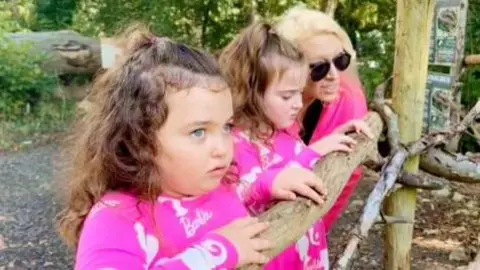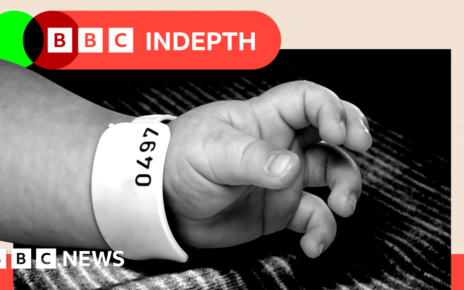By Aimee Thomas, BBC News
 Betsan Gower Gallagher
Betsan Gower GallagherMany children with disabilities or additional learning needs are being denied the right to an education, a report has found.
The Senedd’s children, young people and education committee found the education system in Wales is not doing enough to support their needs.
One parent told BBC News she has faced an endless battle to get support for her seven-year-old twins, who have autism, including for areas like childcare support.
The Welsh government said it was committed to breaking down barriers so that all learners can reach their full potential.
 Betsan Gower Gallagher
Betsan Gower GallagherBetsan Gower Gallagher’s seven-year-old twins Brielle and Bowann are both autistic and non-verbal and require one-to-one care for their needs.
Ms Gower Gallagher, from Trebanos in the Swansea valley, said ensuring the girls had access to an education when they were younger was “exhausting”.
“Everything is a battle as parents of disabled children and everything with education is exhausting,” she said.
“We’re not on the same level playing field as other people.
“Our girls need one-to-one care, and we really had to fight for that.
“We had to prove our children were disabled which is ridiculous,” she added.
Betsan says with the summer holidays approaching, it is difficult to access childcare while she and her husband work.
She said: “I know of places in England [where] they’ve got clubs where they can send their high needs disabled children to, but there is nothing in this area.
“Our childcare at the moment is £1,000 a week for the summer. We both work, but that is an astronomical amount of money.
“Other people can send their children to a summer club which might be around £100 a week, which I think is a fair amount.
“Or even if it was £50 day, but £1,000 a week is ridiculous.”
“I feel discriminated against,” Ms Gower Gallagher added.
“Education and childcare are basic human rights, but disabled children’s needs are being constantly ignored and overlooked.”
The report found that access to education for children with additional needs is “patchy” across Wales, and it often depends on families working hard and on individual staff.
It is calling on the Welsh government to respond to its 31 recommendations from the year-long inquiry.
The recommendations include more training for childcare providers and decisions on financial support to be based on the child’s individual needs.
The committee is also calling for change in areas including funding for schools, training for all school staff, design of new school buildings and changes to transport to and from schools.
 Betsan Gower Gallagher
Betsan Gower GallagherMember of the Senedd Buffy Williams, chair of the committee, said parents were “desperate for support”.
“Through this inquiry, we heard from parents who were… desperate for someone to listen to them. Many of the stories will stay with me forever,” she said.
“We wouldn’t be doing our job if we didn’t take that and put forward the strongest possible case to the Welsh government for what needs to change – that’s what we set out in this report.
“It’s the structure that’s letting them down, not individual teachers or childcare staff who do their best despite it.
“We can’t fail our young people any more. You only get one chance at an education, and it should be the best chance.”
A Welsh government spokesperson said: “Disabled children and young people have a fundamental right to access education and we are committed to breaking down barriers so that all learners can reach their full potential.
“We will continue to work across government and with the Disability Rights Taskforce to listen to families, disabled children and young people to ensure their voices are heard as we consider this work alongside the Senedd committee’s report and recommendations.”





